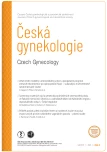Complete androgen insensitivity syndrome – rare case of malignancy of dysgenetic gonads
Authors:
V. Gamcová 1
; J. Eim 1
; Ivana Meixnerová 2
; Robert Hudeček 2
Authors place of work:
Gynekologicko-porodnické oddělení, Nemocnice Vyškov, p. o.
1; Gynekologicko-porodnická klinika LF MU a FN Brno
2
Published in the journal:
Ceska Gynekol 2022; 87(3): 184-187
Category:
Kazuistika
doi:
https://doi.org/10.48095/cccg2022184
Summary
Objective: A case report of a young patient with primary amenorrhea who was diagnosed with agenesis of the uterus and was genetically confirmed for complete androgen insensitivity syndrome with already developed malignancy of dysgenetic gonads. Case report: The 17-year-old patient visited a gynecological clinic for primary amenorrhea. Both ultrasound and vaginal examination revealed suspicion of uterine agenesis, which was subsequently verified during diagnostic laparoscopy. Genetic testing showed karyotype 46,XY, and a rare diagnosis – complete androgen insensitivity syndrome. A secondary finding from a left gonadal biopsy was a Sertoli-Leydig cell tumor. The patient underwent bilateral gonadectomy and was given estrogen replacement therapy. She is now regularly examined by a pediatric oncologist. Conclusion: Complete androgen insensitivity syndrome is a rare genetic disease characterized by varying degrees of feminization in individuals with a male karyotype. It should not be neglected, especially in the differential diagnostic work-up of primary amenorrhea. Genetic testing of the karyotype should be performed whenever uterine agenesis is suspected.
Keywords:
androgen insensitivity syndrome – testicular feminization syndrome – androgen receptor – primary amenorrhea – Sertoli-Leydig cell tumor
Zdroje
1. Gottlieb B, Trifiro MA. Androgen insensitivity syndrome. GeneReviews, 2017 [online]. Available from: https:/ / www.ncbi.nlm.nih. gov/ books/ NBK1429/ .
2. Khollová S, Hrdonková E, Pomahačová R. Syndrom ú plné androgenní insenzitivity – kazuistika. Ceska Gynekol 2014; 79(1): 38–42.
3. Boehmer AL, Brinkmann O, Brü ggenwirth H et al. Genotype versus phenotype in families with androgen insensitivity syndrome. J Clin Endocrinol Metab 2001; 86(9): 4151–4160. doi: 10.1210/ jcem.86.9.7825.
4. Chmel R Jr, Pastor Z, Mužík M et al. Syndrom Mayer-Rokitansky-Küster-Hauser – agene ze dělohy a pochvy: aktuální znalosti a terapeutické možnosti. Ceska Gynekol 2019; 84(5): 386–392.
5. Looijenga LH, Hersmus R, Oosterhuis JW et al. Tumor risk in disorders of sex development (DSD). Best Pract Res Clin Endocrinol Metab 2007; 21(3): 480–495.
6. Batista RL, Costa EM, de Santi Rodrigues A et al. Androgen insensitivity syndrome: a review. Arch Endocrinol Metab 2018; 62(2): 227–235. doi: 10.20945/ 2359-3997000000031.
7. Patel V, Casey RK, Gomez-Lobo V. Timing of gonadectomy in patients with complete androgen insensitivity syndrome-current recommendations and future directions. J Pediatr Adolesc Gynecol 2016; 29(4): 320–325. doi: 10.1016/ j. jpag.2015.03.01.
8. Plevova P, Gerzova H. Vzácné pediatrické ovariální tumory a jejich genetické příčiny. Klin Onkol 2019; 32 (Suppl 2): S79–S91. doi: 10.14735/ amko2019S79.
9. Birnbaum W, Marshall L, Werner R et al. Oestrogen versus androgen in hormone-replacement therapy for complete androgen insensitivity syndrome: a multicentre, randomised, double-dummy, double-blind crossover trial. Lancet Diabetes Endocrinol 2018; 6(10): 771–780. doi: 10.1016/ S2213-8587(18)30 197-9.
10. Hořejší J, Kosová H a kol. Dětská gynekologie. 2. vyd. Praha: Mladá fronta 2019 : 243–245.
Štítky
Dětská gynekologie Gynekologie a porodnictví Reprodukční medicínaČlánek vyšel v časopise
Česká gynekologie

2022 Číslo 3
-
Všechny články tohoto čísla
- Vztah změn mobility uretrovezikální junkce a pooperační progrese stresové inkontinence po sakrospinální fixaci – subanalýza multicentrické randomizované studie
- Screening vrozených vad a geneticky podmíněných onemocnění plodu ve Fakultní nemocnici Olomouc a odesílání/ hlášení do Národního registru reprodukčního zdraví v České republice
- Průběh porodu před císařským řezem a incidence avulze musculus levator ani při prvním následném vaginálním porodu – pilotní studie
- Akutní peripartální hysterektomie – naše 6letá zkušenost
- Syndrom úplné androgenní insenzitivity – raritní kazuistika malignizace dysgenetických gonád
- Hydronefróza jako příznak asymptomatické ureterální endometriózy
- Gravidita v jizvě po císařském řezu
- Systémový lupus erythematosus a sekundární antifosfolipidový syndrom u rodných sester se sníženou plodností
- Fertilitu zachovávající postupy u mladých žen s karcinomem endometria
- Balonková vaginoplastika jako miniinvazivní metoda při řešení vaginální aplazie
- Nádory ovaria a genetická dispozice
- Steroidní metabolom a vícečetné těhotenství
- Recenze knihy Pôrodníctvo
- Prof. MUDr. Alois Martan, DrSc. – 70letý
- Česká gynekologie
- Archiv čísel
- Aktuální číslo
- Informace o časopisu
Nejčtenější v tomto čísle
- Gravidita v jizvě po císařském řezu
- Hydronefróza jako příznak asymptomatické ureterální endometriózy
- Nádory ovaria a genetická dispozice
- Syndrom úplné androgenní insenzitivity – raritní kazuistika malignizace dysgenetických gonád
